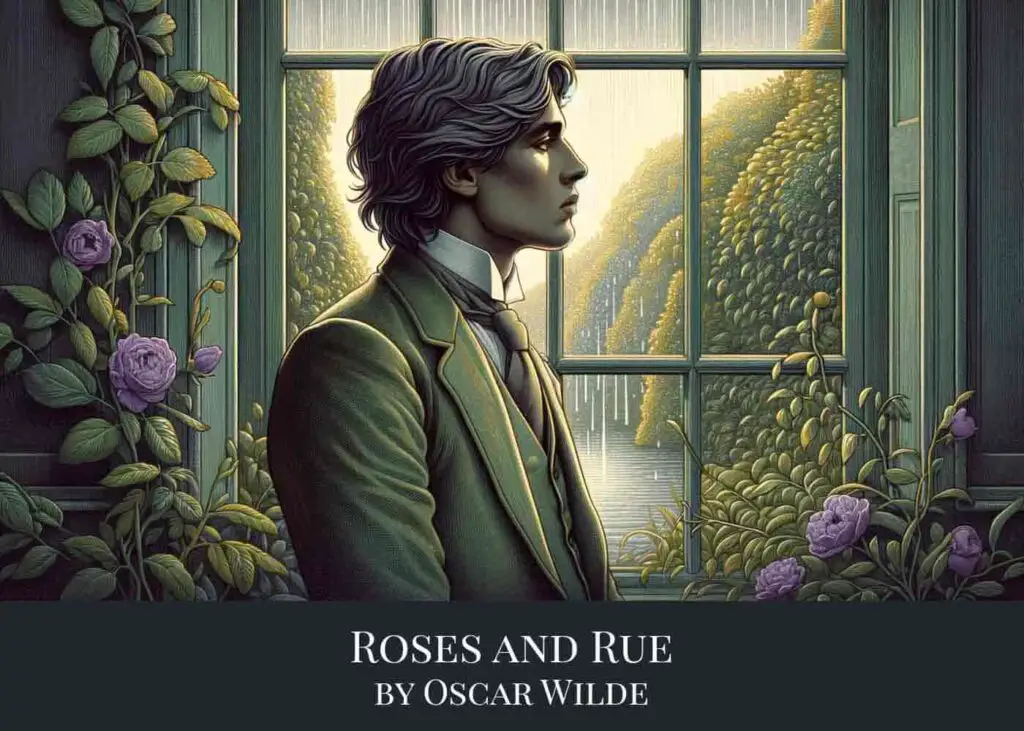
Roses and Rue by Oscar Wilde
“Roses and Rue” by playwright, poet and critic Oscar Wilde is a deeply evocative poem that explores themes of love, memory, and the bittersweet nature of nostalgia. Featured in Oscar Wilde’s first poetry collection Poems, “Roses and Rue” stands out for its vivid imagery and emotional depth. Wilde masterfully weaves a tapestry of memories, reflecting on a past love affair with both fondness and a poignant sense of loss. The poem delves into the intricacies of a relationship that, while filled with moments of beauty and joy, ultimately ends in heartache. The language is rich and lyrical, typical of Wilde’s eloquent style, transporting the reader into a world of reflective introspection.
For those interested in exploring more of Wilde’s poetic genius, Poems online book is available at PageVio.
1. The Poem
Could we dig up this long-buried treasure,
Were it worth the pleasure,
We never could learn love’s song,
We are parted too long.
Could the passionate past that is fled
Call back its dead,
Could we live it all over again,
Were it worth the pain!
I remember we used to meet
By an ivied seat,
And you warbled each pretty word
With the air of a bird;
And your voice had a quaver in it,
Just like a linnet,
And shook, as the blackbird’s throat
With its last big note;
And your eyes, they were green and grey
Like an April day,
But lit into amethyst
When I stooped and kissed;
And your mouth, it would never smile
For a long, long while,
Then it rippled all over with laughter
Five minutes after.
You were always afraid of a shower,
Just like a flower:
I remember you started and ran
When the rain began.
I remember I never could catch you,
For no one could match you,
You had wonderful, luminous, fleet,
Little wings to your feet.
I remember your hair—did I tie it?
For it always ran riot—
Like a tangled sunbeam of gold:
These things are old.
I remember so well the room,
And the lilac bloom
That beat at the dripping pane
In the warm June rain;
And the colour of your gown,
It was amber-brown,
And two yellow satin bows
From your shoulders rose.
And the handkerchief of French lace
Which you held to your face—
Had a small tear left a stain?
Or was it the rain?
On your hand as it waved adieu
There were veins of blue;
In your voice as it said good-bye
Was a petulant cry,
‘You have only wasted your life.’
(Ah, that was the knife!)
When I rushed through the garden gate
It was all too late.
Could we live it over again,
Were it worth the pain,
Could the passionate past that is fled
Call back its dead!
Well, if my heart must break,
Dear love, for your sake,
It will break in music, I know,
Poets’ hearts break so.
But strange that I was not told
That the brain can hold
In a tiny ivory cell
God’s heaven and hell.
Size: 8″ x 12″ (2:3 ratio)
Format: PDF
Copyright information: For personal use only
Note: Actual poster background color is white. For the sample poster, the background is made gray for illustration purpose.
2. Roses and Rue Analysis
“Roses and Rue” is a reflection on a past love, tinged with nostalgia, regret, and a deep sense of loss. The speaker reminisces about a past relationship, recalling vivid and intimate details. However, it is clear that this relationship has ended, leaving the speaker with bittersweet memories.
Long-Buried Treasure: The “long-buried treasure” refers to the cherished memories of a past love. The speaker ponders whether it would be worth it to unearth these memories, suggesting that although they are precious, they may also bring pain due to the loss of that love.
Passionate Past: The second stanza speaks to the intensity of the past relationship and the longing to relive those moments. The repetition of “Could we live it all over again, were it worth the pain!” emphasizes the internal conflict between the desire to return to those times and the recognition that it might be too painful.
Memories of Meetings: The middle stanzas are filled with detailed, sensory-rich memories of the speaker’s time with his lover. From the setting of their meetings to the physical and emotional characteristics of the lover, these details paint a vivid picture of their encounters and the deep impression they left on the speaker.
Metaphors and Similes: The poem uses various metaphors and similes, comparing the lover to a bird, a flower, and natural phenomena. These comparisons enhance the sense of beauty and delicacy associated with the lover and the relationship.
Painful Farewell: The mention of a parting, marked by a “petulant cry” and the haunting line “You have only wasted your life,” introduces a tone of regret and unresolved tension. It suggests a painful and perhaps abrupt end to the relationship, which deeply affects the speaker.
Heartbreak and the Poet’s Heart: The poem concludes with a reflection on the inevitability of heartbreak and the poetic notion that heartbreak is intrinsic to the speaker’s experience. It also touches on the profound capacity of the human mind to contain both immense joy and sorrow (“God’s heaven and hell”).
Overall, “Roses and Rue” is a poignant exploration of love and loss, highlighting the enduring impact of past relationships and the complex emotions involved in remembering a deep but lost love.
3. Conclusion
We hope that Oscar Wilde’s “Roses and Rue” has resonated with you deeply. Feel free to delve into more of Oscar Wilde’s poetry from Sevenov.